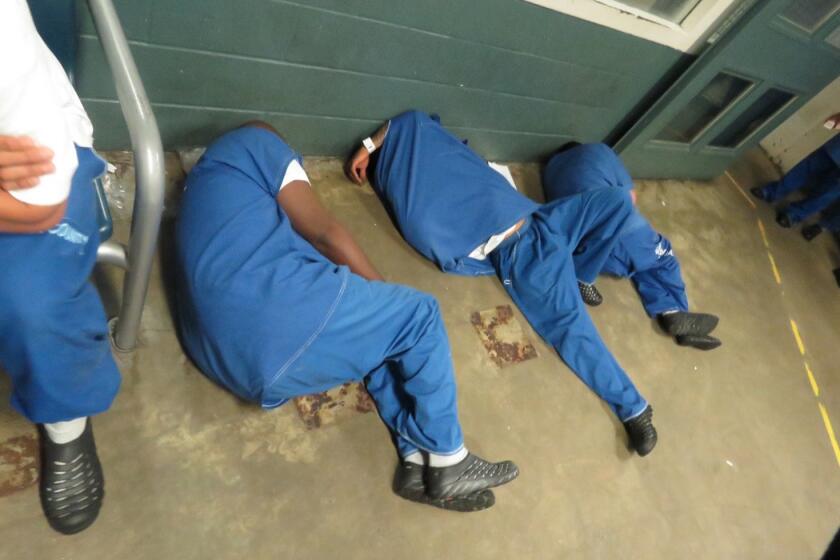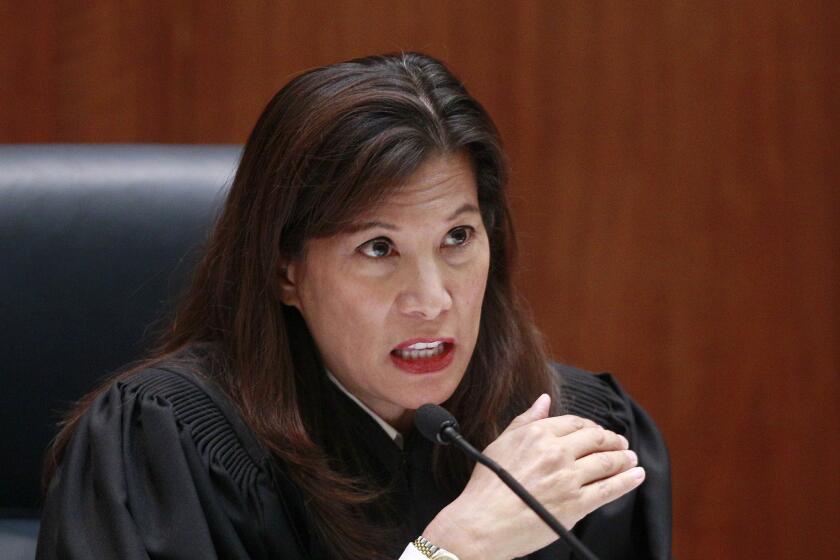Editorial: Court brings back sanity, and the Constitution, in Los Angeles bail ruling

- Share via
Zero-dollar bail is back for most people arrested in Los Angeles County for nonviolent crimes, after a Superior Court judge ruled that jailing people just because they can’t pay money bail before their first court hearing is a “clear, pervasive and serious constitutional violation.”
The ruling granting a preliminary injunction against use of bail schedules is welcome, and should have been obvious. L.A.’s system of pretrial detention — like most in California and around the nation — is improperly based on the accused’s wealth or poverty, not on their risk to flee or endanger the public. That’s a blatant breach of the right to equal protection under the law, words that Judge Lawrence P. Riff noted are “chiseled into the main beam atop the United States Supreme Court building.”
The ruling temporarily reinstates the emergency zero-dollar bail schedule (a roster of crimes and assigned bail amounts) put in place during the COVID era to reduce jail overcrowding and limit the transmission of the virus. As was the case then, the order bringing back zero-dollar bail does not apply to people accused of violent or serious felonies or misdemeanors, including domestic violence, child abuse, even vandalism. It does not apply to people who are already on no-bail release and are arrested a second time.
Allegations that zero-dollar bail increased crime in Los Angeles County during the COVID pandemic are groundless. It did not. L.A. law enforcement officials acknowledge that most crimes declined when the zero-dollar bail policy was in effect, from April 2020 to June 2022.
Yet that didn’t stop the Superior Court from reinstating money bail, and it didn’t stop the city and county from opposing the lawsuit challenging the bail schedule as unconstitutional.
The money bail system betrays a host of fundamental American values, including the presumption of innocence, the right to counsel and equality in the eyes of the law.
Over nearly two months of hearings, Riff repeatedly invited the defendants — elected officials and law enforcement leaders for L.A. city and county — to present evidence that the emergency bail schedules adopted by the Superior Court and used at police and sheriff’s stations are lawful and protect the public.
But Riff noted that the defendants offered no witnesses, data or studies to counter the plaintiffs’ evidence showing that money bail is unjust to the accused and unsafe for the public.
The judge pointed out that he had invited L.A. Mayor Karen Bass, L.A. County Sheriff Robert Luna, the L.A. police chief, the L.A. City Council and the county Board of Supervisors to testify in defense of bail schedules, but all declined.
Instead, the city and county argued that it was up to the judges and the Legislature to fix the problem. L.A. County officials have been dithering over bail reform for years but have accomplished little, leading to the lawsuit, which was filed in November on behalf of Phillip Urquidi and five other accused people who were locked up prior to arraignment only because they couldn’t pay. The county and city ought to have settled the case well before the hearings, knowing that they didn’t have much of a defense. But they insisted on moving forward.
Political cowardice has given us a half-century of increasingly inhuman incarceration conditions and has diminished safety both inside and outside Los Angeles County jails.
Two years ago, the Board of Supervisors vowed to close the dangerous Men’s Central Jail by March of this year, but didn’t, because the county had failed to sufficiently reduce the jail population. The biggest reason was the end of zero-dollar bail a year ago, which led to more people being unnecessarily locked up solely because they couldn’t afford bail. The supervisors and the sheriff failed to adopt alternatives that would safely keep hundreds of people out of jail.
In the interim, county jails have become even more dangerous, with people shackled to chairs as they wait for days to be seen by medical and mental health clinicians.
In addition to declaring that L.A.’s bail schedules are unconstitutional, Riff’s ruling importantly takes note of the overwhelming evidence that money bail actually endangers public safety. Numerous peer-reviewed academic studies establish that money bail doesn’t make it any more likely that an accused person will return to court for trial, or any less likely that they will commit new crimes.
Critics, including the state sheriff’s association, don’t seem to know how bail works.
In fact, the opposite is true. People locked up even for the period between arrest and their arraignment (when they first appear before a judge) are more likely to commit new crimes. Being incarcerated — when they could have gotten out if they had money — pushes them further into the margins, keeping them from their jobs, subjecting them to inhumane jail conditions, endangering their mental health.
County and city officials know all of this, but they‘ve stuck with money bail anyway because they lack the political courage to end it. Law enforcement leaders ought to know it too, because the data are widely available.
Riff’s order compels them to finally act. The COVID-era zero-dollar bail policy will be in effect for 60 days while the parties hammer out safe and constitutionally acceptable alternatives, which may include text reminders of court dates and a variety of pretrial services or supervision. The parties will report their plan to Riff by July 5, and if he approves, it will take effect July 17. If the city and county continue to shirk their leadership role by continuing to fight the order, there will be a full trial next year.
The ruling does not apply in cities other than Los Angeles that have their own jails, such as Glendale. But they would be wise to take note of the ruling that their practices, too, are unconstitutional, and act quickly to correct the problem.
The reliance on money bail to determine who is locked up and who goes free is an insult to the American principles of liberty and justice. Persistent belief that it keeps us safe despite overwhelming evidence to the contrary is little more than superstition.
And knowing that it is wrong and ineffective, and yet defending it, is a cowardly dereliction of duty.
More to Read
A cure for the common opinion
Get thought-provoking perspectives with our weekly newsletter.
You may occasionally receive promotional content from the Los Angeles Times.













